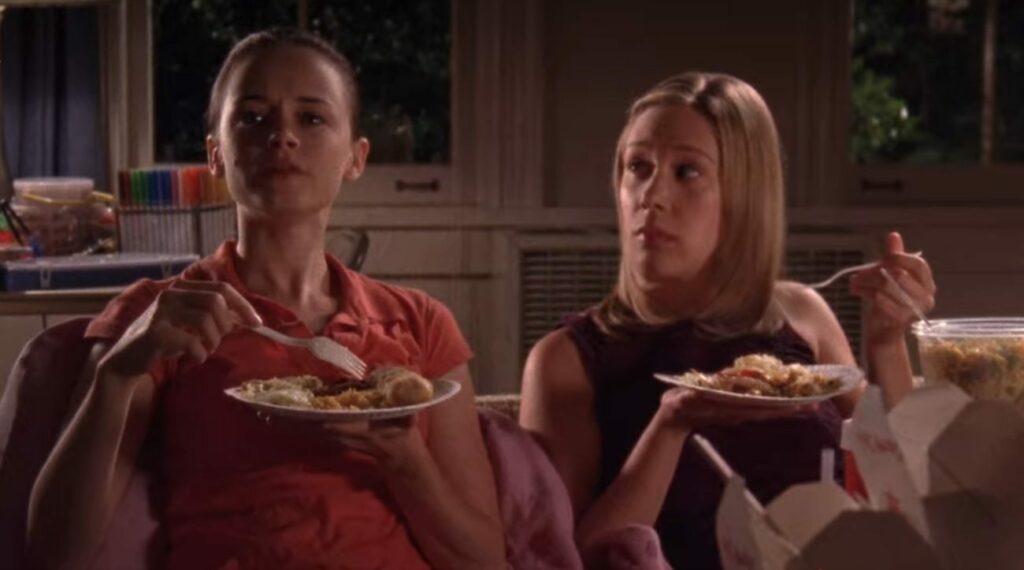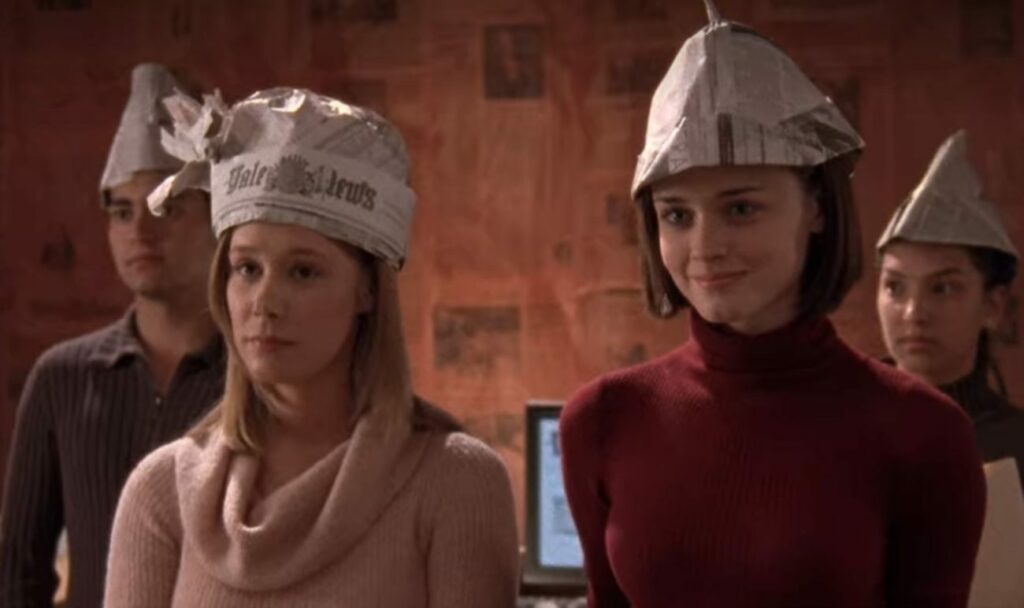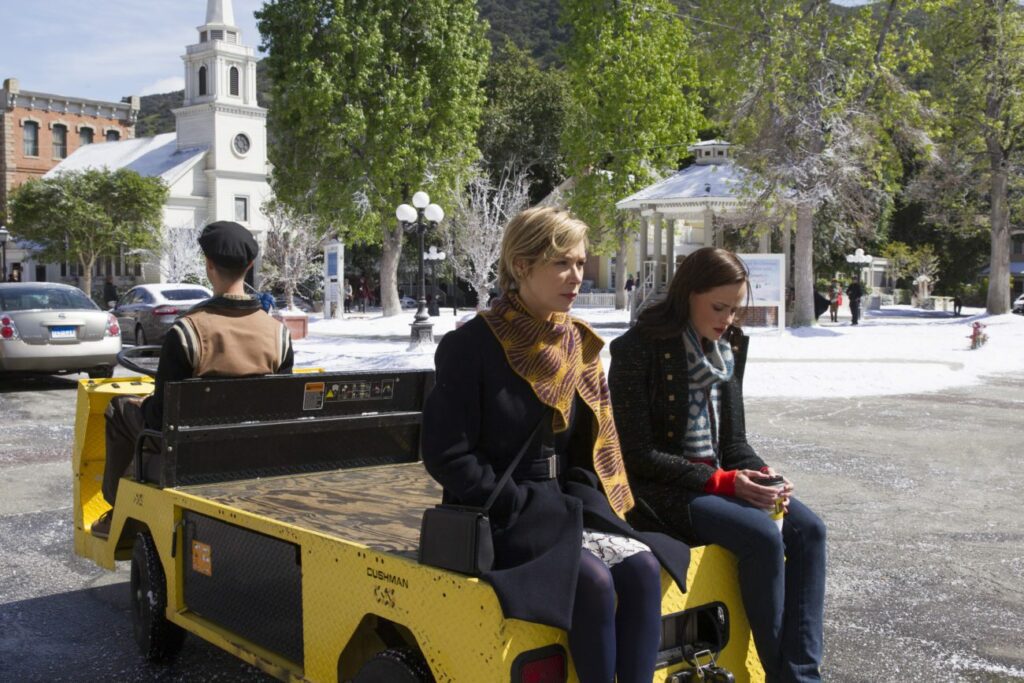Surrounded by shows like One Tree Hill, Dawson’s Creek, and even her fellow characters in Gilmore Girls, where female characters rarely existed outside a relationship, Paris Geller (Liza Weil) was unique. She was a main character who wasn’t interested in dating. The few instances in the early seasons when she did date, it didn’t amount to much. She had a failed date with Tristan (Chad Michael Murray), a mostly off-camera relationship with Jamie (Brandon Barash), and an entirely out-of-character relationship with the much older Professor Fleming (Michael York). Even her later relationship with Doyle (Danny Strong), which is the longest one featured in the show, didn’t always come across as romantic. Instead, the two seemed to be extraordinarily good friends who were missing a romantic spark. There was no lack of chemistry between the two and Paris and Doyle went toe-to-toe in the delightful banter that Amy Sherman-Palladino is so well-known for. They matched each other’s strokes perfectly, but it just never felt romantic.
In the context of the other young women on the show, Paris is starkly different. Not just because of the way she treated every facet of her life with an intensity, but because of her lack of interest in romantic partners. Lane (Keiko Agena), whose social life was severely monitored by her overbearing mother (Emily Kuroda), had a series of crushes on boys in town: Rich Bloomenfeld (Chase Penny), Todd (Lukas Behnken), Henry Cho (Eddie Shin), Dave Rygalski (Adam Brody), and Zack (Todd Lowe). Rory’s (Alexis Bledel) entire life was wrapped up in whatever boy she was dating. That much is obvious by the way fans talk about the show. Are they more of a Dean (Jared Padalecki), Jess (Milo Ventimiglia), or Logan (Matt Czuchry) fan? Rory, the character, became flimsier as the series went on. Her storylines were tangled in her romantic relationships, and her years at Yale were particularly egregious in this regard.

Paris rarely made comments about being interested in people romantically, and when she did, it never felt fully realized. Just a half-hearted, simplistic attempt by the writers to soften her by showing that she was “desirable.” They didn’t realize that her roughness was what made Paris impossible to look away from. There was something intoxicating about the way Paris moved through the world. She had a confidence that wasn’t given to teen girl characters in the early 2000s.
Perhaps that’s what makes Paris feel queer. In a time where the male gaze ruled teen dramas, it felt a little groundbreaking that Paris was so fundamentally unbothered about conforming to traditional societal norms. Confidence back then, in terms of teenage girls, was performative for the male pleasure. [The scene from One Tree Hill where Brooke (Sophia Bush) appears naked in the back of Lucas’ (Chad Michael Murray) car is the quintessential example of this phenomenon.] Nothing about what Paris did was for the male gaze. She couldn’t care less about what the general population thought of her. She had a few important people in her life whose opinions she valued. The person whose opinion she valued most? Rory Gilmore.

Many fans believe that Paris had been secretly in love with Rory since they met at Chilton and that Paris’ initial bullying was akin to the (problematic) boy-tugs-on-pigtails-of-the girl-he-likes adage. Without fully delving into Paris’ bullying of Rory, there is some truth to repressed LGBT people expressing that repression through violence and anger. By no means is this an excuse for Paris’ actions, but it could explain the intensity of them. Many LGBT people know how overwhelming that first crush can be because it’s more than just a crush. It’s the realization that they might identify as queer. It’s a lot to process at one time, especially as a teen, and some people resort to bullying as a means of hiding their true feelings.
When looking at Paris’ character arc through the series, it is easy to see her relationship with Rory as a romantic pairing instead of platonic. Arguably, Rory opened up to Paris more honestly than to any of the boys she dated, while Paris relied on Rory for emotional support from the beginning. Paris was also never that broken up when things in her romantic relationships went south, but couldn’t handle when something between her and Rory was amiss. When Rory became the newspaper editor at Yale, Paris couldn’t cope and moved all of Rory’s belongings out of their shared apartment. It was less about the fact that Rory got the job and more that Paris felt like Rory instigated Paris’ ousting as previous editor. It was the betrayal by someone she cared deeply for that made the news hard to handle. Paris and Rory had a long history together and, at least for Paris, there was always something more bubbling beneath the surface.

In their vulnerable scenes together, Paris looked at Rory with more love than any boy she dated. It didn’t feel platonic from Paris’ side. The way their relationship played out felt so much like that of an unrequited teenage love story. One that wouldn’t have stood a chance on a mainstream TV show in the early 2000s. Gilmore Girls was not particularly nuanced in many of its storylines, but a deft, gentle hand was needed to take Paris’ story to the depths it deserved to go.
Nothing about these speculations or perceived subtext takes away from her long term relationship with Doyle. In the revival of the series, she and Doyle have children and are in the midst of a divorce. The reason for their break-up is that Doyle wanted to be a screenwriter and Paris couldn’t understand why he would want to do something creative instead of scholarly. There are a multitude of ways to to interpret Paris and Doyle’s relationship. Whether that be Paris falling somewhere in the bisexuality realm of the sexuality spectrum or that she chose to be with Doyle as a means of hiding her true sexuality. It’s not outside the realm of possibility that Paris would see this relationship as part of cultivating her picture perfect image. It would explain why she chose divorce as soon as Doyle deviated from the plan and the image of the couple she had pictured for them. There are also plenty of real-life examples of queer people getting married and having kids before coming out. Paris was such an intricate character that any of these possibilities could have been true.
Where exactly Paris fell on the sexuality spectrum will forever be a mystery. Not only because she’s a fictional character who cannot speak for herself, but because there are no plans for another Gilmore Girls revival at this time. Despite that, fans still cling to Paris Geller as subtextually queer. If Gilmore Girls was rebooted from the beginning now, there’s no doubt in my mind that Paris would be queer. In fact, you can almost hear Paris’ irritated voice saying something like, “Sexuality is a spectrum, Rory. I’m sorry that your backward small-town childhood made you think that sex was just between a farmer and his brain-dead housewife, but this is the real world.”

